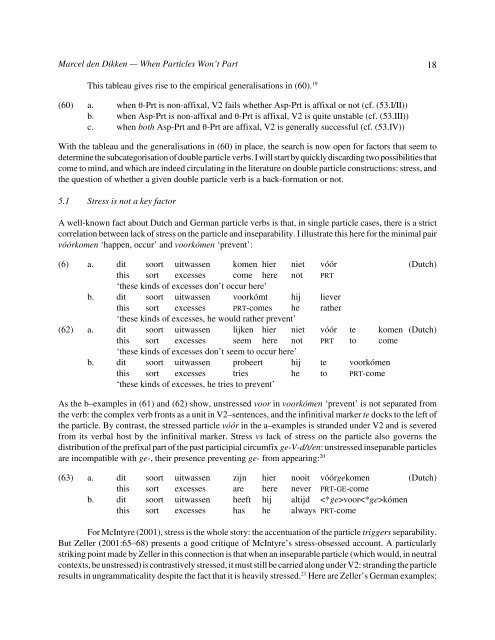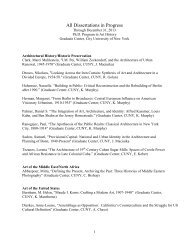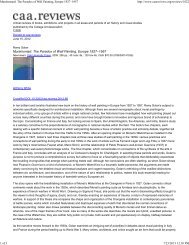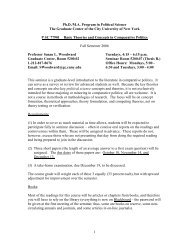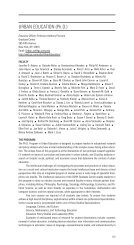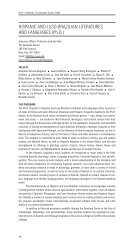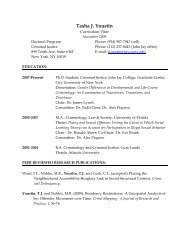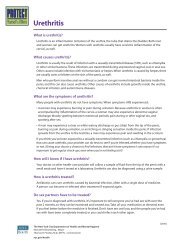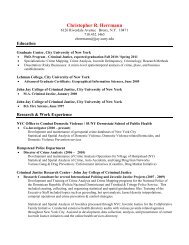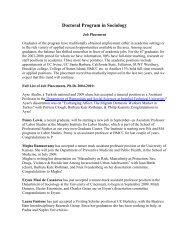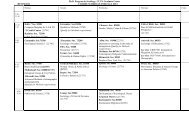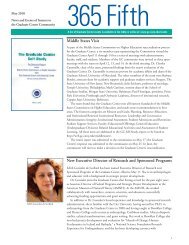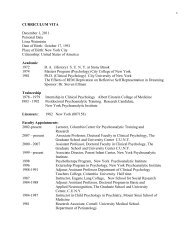When Particles Won't Part - CUNY Graduate Center
When Particles Won't Part - CUNY Graduate Center
When Particles Won't Part - CUNY Graduate Center
You also want an ePaper? Increase the reach of your titles
YUMPU automatically turns print PDFs into web optimized ePapers that Google loves.
Marcel den Dikken — <strong>When</strong> <strong><strong>Part</strong>icles</strong> Won’t <strong>Part</strong><br />
This tableau gives rise to the empirical generalisations in (60). 19<br />
(60) a. when 2-Prt is non-affixal, V2 fails whether Asp-Prt is affixal or not (cf. (53.I/II))<br />
b. when Asp-Prt is non-affixal and 2-Prt is affixal, V2 is quite unstable (cf. (53.III))<br />
c. when both Asp-Prt and 2-Prt are affixal, V2 is generally successful (cf. (53.IV))<br />
With the tableau and the generalisations in (60) in place, the search is now open for factors that seem to<br />
determine the subcategorisation of double particle verbs. I will start by quickly discarding two possibilities that<br />
come to mind, and which are indeed circulating in the literature on double particle constructions: stress, and<br />
the question of whether a given double particle verb is a back-formation or not.<br />
5.1 Stress is not a key factor<br />
A well-known fact about Dutch and German particle verbs is that, in single particle cases, there is a strict<br />
correlation between lack of stress on the particle and inseparability. I illustrate this here for the minimal pair<br />
vóórkomen ‘happen, occur’ and voorkómen ‘prevent’ :<br />
(6) a. dit soort uitwassen komen hier niet vóór (Dutch)<br />
this sort excesses come here not PRT<br />
‘these kinds of excesses don’ t occur here’<br />
b. dit soort uitwassen voorkómt hij liever<br />
this sort excesses PRT-comes he rather<br />
‘these kinds of excesses, he would rather prevent’<br />
(62) a. dit soort uitwassen lijken hier niet vóór te komen (Dutch)<br />
this sort excesses seem here not PRT to come<br />
‘these kinds of excesses don’ t seem to occur here’<br />
b. dit soort uitwassen probeert hij te voorkómen<br />
this sort excesses tries he to PRT-come<br />
‘these kinds of excesses, he tries to prevent’<br />
As the b–examples in (61) and (62) show, unstressed voor in voorkómen ‘prevent’ is not separated from<br />
the verb: the complex verb fronts as a unit in V2–sentences, and the infinitival marker te docks to the left of<br />
the particle. By contrast, the stressed particle vóór in the a–examples is stranded under V2 and is severed<br />
from its verbal host by the infinitival marker. Stress vs lack of stress on the particle also governs the<br />
distribution of the prefixal part of the past participial circumfix ge-V-d/t/en: unstressed inseparable particles<br />
are incompatible with ge-, their presence preventing ge- from appearing: 20<br />
(63) a. dit soort uitwassen zijn hier nooit vóórgekomen (Dutch)<br />
this sort excesses are here never PRT-GE-come<br />
b. dit soort uitwassen heeft hij altijd voorkómen<br />
this sort excesses has he always PRT-come<br />
For McIntyre (2001), stress is the whole story: the accentuation of the particle triggers separability.<br />
But Zeller (2001:65–68) presents a good critique of McIntyre’ s stress-obsessed account. A particularly<br />
striking point made by Zeller in this connection is that when an inseparable particle (which would, in neutral<br />
contexts, be unstressed) is contrastively stressed, it must still be carried along under V2: stranding the particle<br />
results in ungrammaticality despite the fact that it is heavily stressed. 21 Here are Zeller’ s German examples:<br />
18


